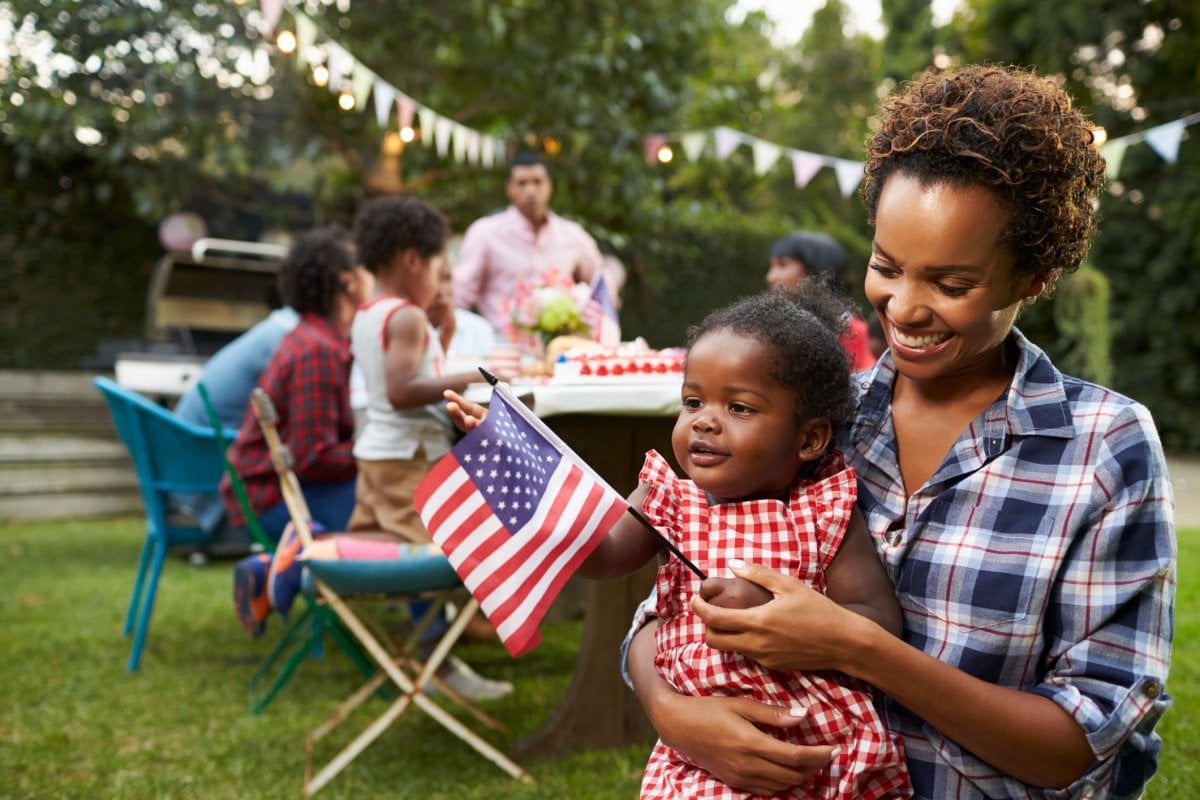It’s a beautiful, cloudless day! The sun is shining, birds are singing, and the smell of tasty food is in the air. For many people, one of the best parts of summer is going to outdoor celebrations and parties. There’s just something about eating outdoors that makes ordinary food taste great. And it turns ordinary gatherings into events to look forward to and remember.
In the U.S., our most popular cookout day is July 4th, Independence Day — the day we celebrate our freedom and commemorate our rejection of tyranny. The day we reaffirm our commitment to “life, liberty, and the pursuit of happiness.” So, it’s ironic that many of our 4th of July customs actually shorten our lives, undermine our liberty, and tarnish our happiness.
You may dismiss this article as “Debbie Downer” material, whining about the environmentally damaging consumption that characterizes so many of our 4th of July traditions. Fortunately, I’m not just pointing fingers at unsustainable and unhealthy practices. I’ll also share alternatives that are at least as festive, memorable, and delicious and are much more in keeping with the original intent of the holiday.
But what if you live outside the U.S. or don’t celebrate 4th of July? I’m still confident that “life, liberty, and the pursuit of happiness” are pretty high priorities. You might even consider adopting some of these tips in your own summer celebrations.
Protecting the Environment
Feeding and entertaining guests at cookouts can be a lot of work. So it’s only natural that we want to make things as easy as possible — like cleanup, for example. Unfortunately, disposable plates, utensils, and cups can just end up in a big garbage bag.
No question that relying on single-use items is convenient in the short-term. And also no question that our disposable mindset is taking a huge toll on our health and on the environment. Even if none of those plastic spoons and cups end up as “litter” on the ground, they all end up somewhere. And they can hang around for tens of thousands of years, polluting the air, soil, and water upon which our lives depend.
Air Pollution
It’s not just the throwaway plastic and paper that can damage the environment. It turns out that the day after Independence Day, July 5th, is one of the days of the year with the worst air quality, due to two of our beloved traditions: grilling and fireworks.
Grilling is a favorite pastime during the summer, all over the world, but it reaches a whole new level of obsession in the United States during 4th of July celebrations.
In 2017, Americans were projected to spend over $7 billion on cookouts and other outdoor celebrations during Independence Day. Sure, that represents a lot of food (more on that below), but also a lot of smoke. Pair that with the heavy-metal-tainted smoke from millions of pounds of fireworks (that contribute to 42% more pollutants in the air after the holiday) and the sparkling allure of a summer cookout or celebration quickly gets tainted by the toxic cocktail of harmful and potentially carcinogenic chemicals floating around.
A Note About Fireworks
Although fireworks are a traditional way to celebrate the 4th of July and other summertime celebrations, they’re really bad for the environment. In addition to contributing to air pollution, the propellants, colorants, and heavy metals in fireworks can end up in the soil or waterways, polluting our drinking water or the ocean. (Fireworks are also notoriously bad for our pets, especially dogs, who are often deeply disturbed by the loud noises.)
Limit your use of personal fireworks if possible. And if you love fireworks, try carpooling with friends and family to a large, organized event. If public transportation can reduce pollution by taking cars off the road, then public fireworks — which, let’s face it, are far more spectacular than the roadside stand variety that not only represent fire hazards, but maim and deafen dozens of revelers each Independence Day — can reduce air pollution too while more than satisfying our desire for bright, pretty lights and things that go bang.
Or, if you’re going for a sustainable party at home, try one of these no-smoke lighting alternatives instead.
- Eco-friendly floating lanterns
- LED candles in glass hurricanes
- Solar powered LED string lights
- Laser light show
- Light projectors
Before you gas up the grill, light up those sparklers, or go shopping for party supplies, think how they might impact your health and the environment, and consider more eco-friendly choices to have a more sustainable 4th of July (or other summertime celebration).
The Trouble with BBQs
One of the more popular ways to celebrate outdoors during the Summer is with a BBQ. However, the food most people typically throw on a grill doesn’t exactly scream healthy or sustainable.
Meats of all kinds, especially hot dogs, steaks, hamburgers, and chicken top the list of most grilled foods.
No matter how it’s cooked, meat has been shown to cause inflammation in the body as well as contribute to chronic disease.
But grilled meat causes additional problems.
Cooking meat at high temperatures, such as on a grill, creates Heterocyclic amines (HCAs) and polycyclic aromatic hydrocarbons (PAHs) — carcinogenic compounds formed when the fat and juices in meat drip onto an open flame.
These compounds end up sticking to the food as well as being released into the air. (The good news is that HCAs and PAHs don’t form when you grill fruits and vegetables!)
Since most grills use charcoal as their heating source, additional greenhouse gases like carbon monoxide and nitrous oxide are emitted as well. The chef and nearby guests can compromise their health just by breathing in those delicious, evocative aromas — even if they skip the meat entirely.
When you add these local effects to the enormous amount of greenhouse gas emissions, like methane, caused by animal agriculture, you can see why barbequed meat is a recipe for air pollution and environmental harm.
Alternatives to Charcoal Grills
If you have to use charcoal, choose lump charcoal, which is pure wood without additives, chemicals, or infused lighter fluid. Lump charcoal also tends to come from sustainably sourced wood, whereas most briquettes do not.
However, there are other alternatives to charcoal that can help you have a more sustainable 4th of July (or other summertime party). Reduce the amount of air pollution from grilling by switching to one of these energy sources.
Natural Gas & Propane
Although they’re sourced from fossil fuels, natural gas and propane emit about half the CO2 each hour, compared to charcoal.
They’re also more efficient. During the production of natural gas and propane, about 90% of the material is usable, whereas charcoal only produces 20-35% usable product.
And grilling with gas means that you have to keep the grill on only while the food is cooking, unlike charcoal, which will continue to burn until it goes out naturally or you douse it with water.
Electric
Electric grills don’t require the purchase of an additional fuel source, and you can adjust the temperature while grilling. A typical outdoor electric grill has an output of around 1500 watts, or 1.5 kWh, which is about the same as a space heater or hair dryer.
As a result, electric grills are only a more sustainable choice than charcoal if your home runs on renewable energy such as solar, wind, or microhydropower.
Solar-Powered
Purely solar-powered grills are available, although they’re still rare and run on the expensive side. But since you’re relying solely on the sun as an energy source, you’ll likely save money in the long run while also preventing contribution to carbon emissions. Here’s one that sounds promising.
Tip: To go even further with increasing the sustainability of your BBQ or cookout, you can even DIY a reflector or box solar cooker.
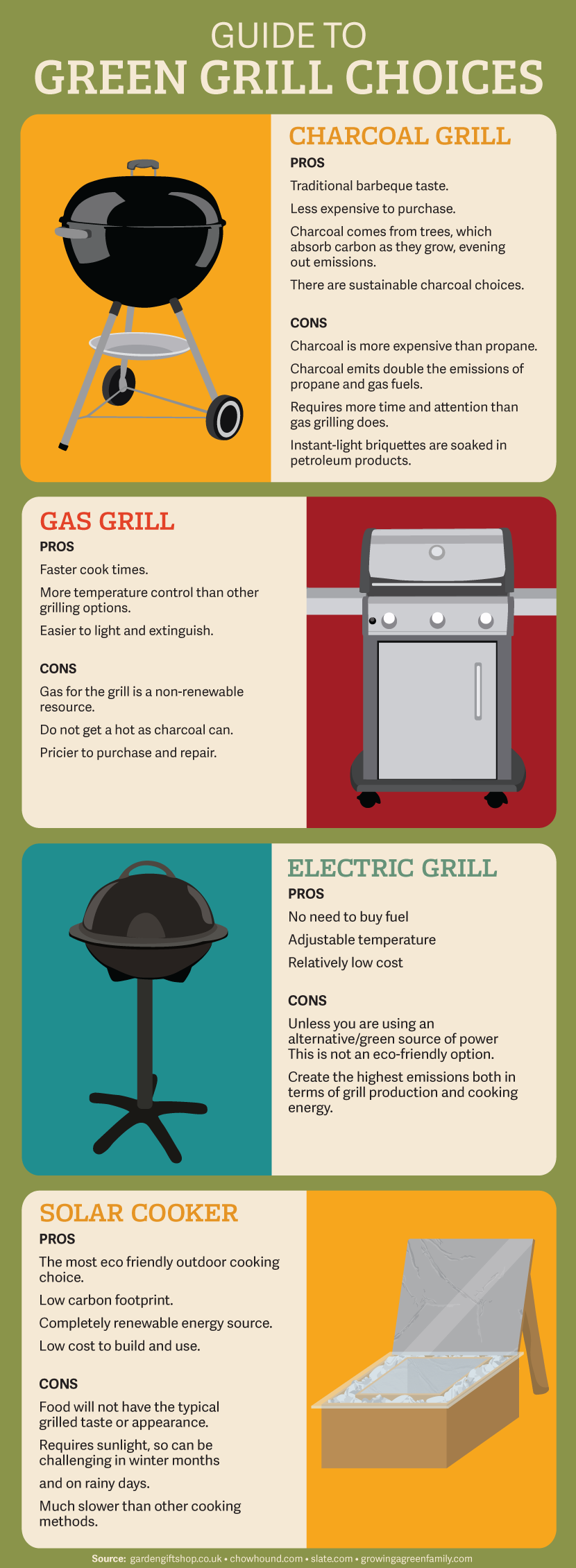
Plant-Powered 4th of July (or anytime) BBQ recipes
Give these plant-powered recipes a try for a healthy spin on BBQ classics.
Smoky Black Bean Burger by The Simple Veganista
These grillable veggie burgers are low-fat, high-fiber, and full of healthy grains, seeds, and spices.
Grilled Vegetable Fajitas by Karyl’s Kulinary Krusade
Colorful red, yellow, and green bell peppers, red onions, baby bella mushrooms, and zucchini make up these delicious veggie fajitas topped off with a smoky and spicy seasoning. Omit the oil for a heart-healthier version.
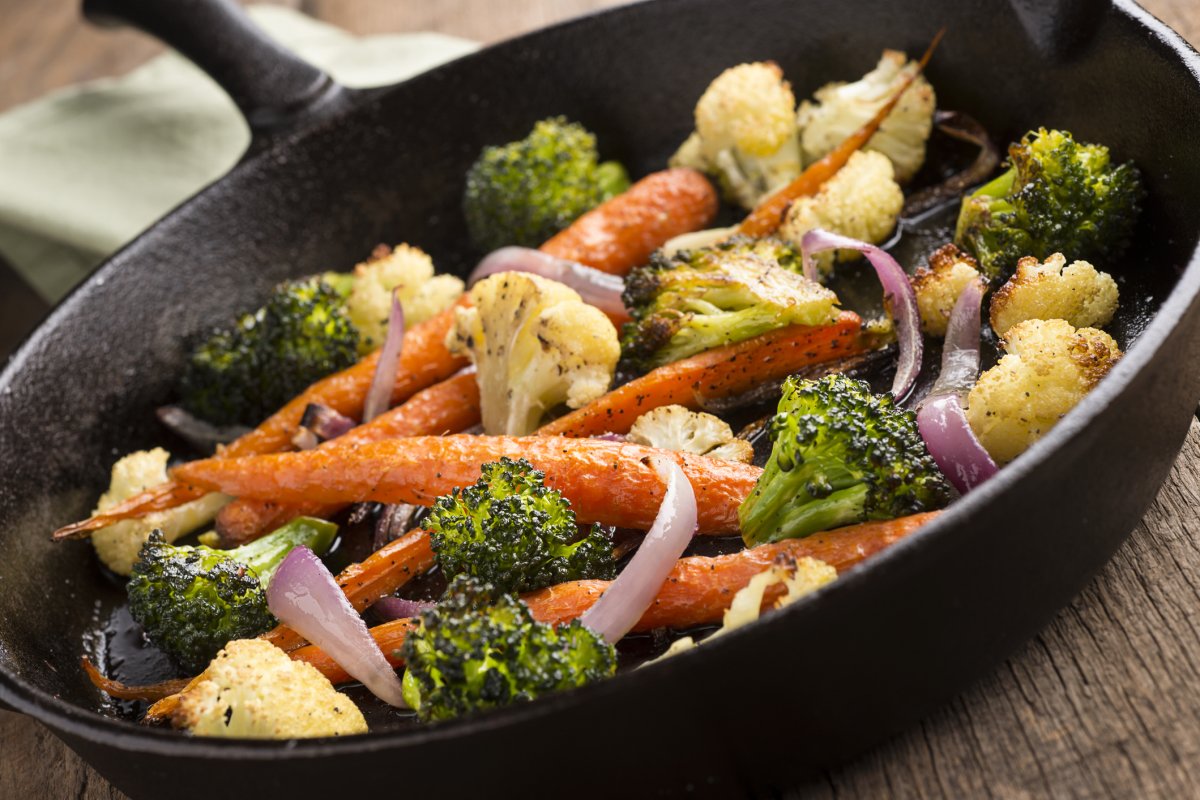
Smoky Carrot Dogs by Brand New Vegan
You won’t find any ground up animal parts in these hot dogs. Simply boil, marinate, and then grill whole carrots and pile high with your favorite condiments and toppings.
Honey Lime Grilled Fruit Skewers by Love & Zest
Who doesn’t love food on a stick? Try this sweet, grilled fruit skewer recipe for a fun take on a kabob. It’s perfect for a summer cookout appetizer or dessert.
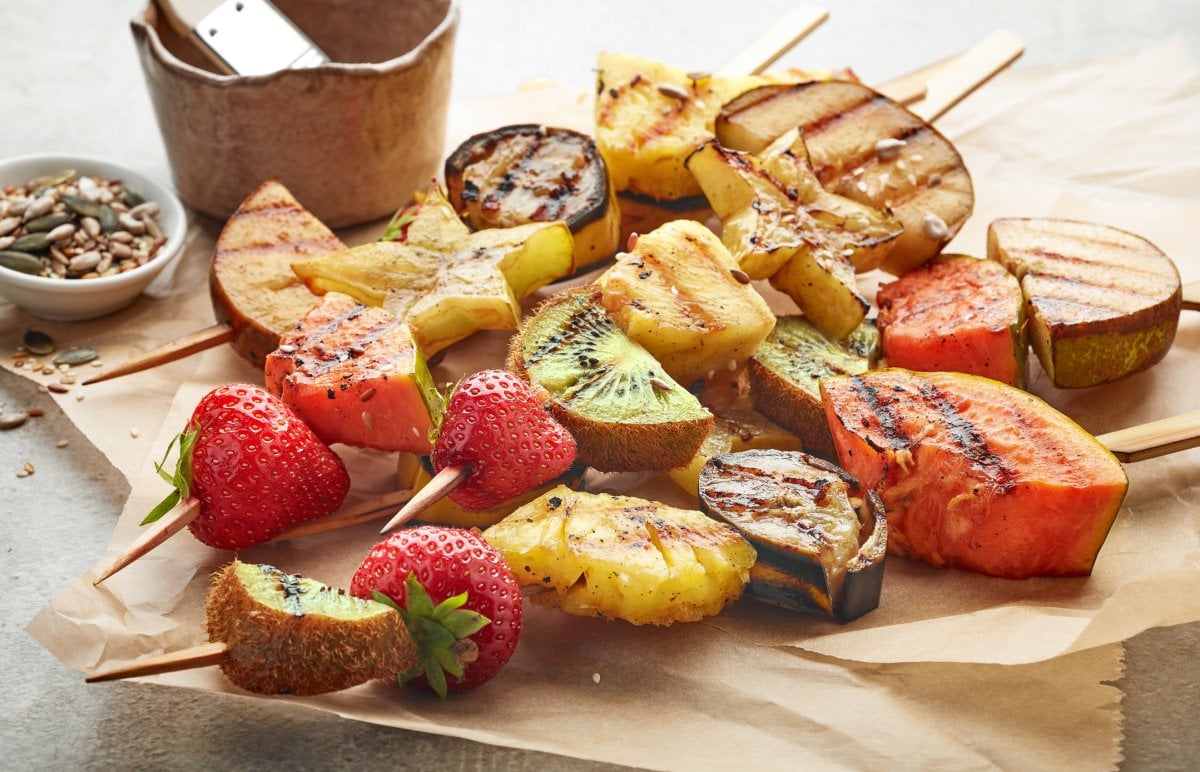
Tip: Although grills are typically greased up with unhealthy and environmentally unfriendly cooking spray or processed oils to prevent sticking, you can get the same non-stick effect by rubbing a potato, onion, or lemon on the grill surface. Delicious!
Reduce Plastic Use This Summer
When shopping for food and other summer cookout supplies, consider buying in bulk to cut down on plastic packaging consumption.
Around 40% of all plastic produced becomes packaging that’s used just once and then discarded.
All of this waste has created more than 6.9 billion tons of plastic trash, with more than 5 trillion pieces of plastic currently polluting our oceans.
In addition to ending up in the stomachs of fish and other wildlife, plastic also kills over 100,000 marine animals annually.
And research has shown that many of the chemicals in plastics, such as BPA and BPS, are harmful to human health — disrupting hormones and contributing to chronic disease.
So, what else can you do during summer parties to reduce your use of plastics?
Use Biodegradable or Reusable Cutlery
Before throwing that box of plastic spoons, knives, and forks into your shopping cart, consider that it may take over 100 years for them to begin breaking down and over 1,000 years for them to decompose completely.
Instead, try a more sustainable cutlery alternative at your 4th of July or other outdoor, summertime celebration.
Option 1: Silverware
The best option would, of course, be just to use silverware from home and take the time to wash everything afterward. (The same goes for plates and cups.)
Silverware is safe to reuse, and the only additional resources it requires is a little soap and water.
Don’t have enough for a big event? You might be able to shore up your supply from a local thrift store or ask some of the other participants to pitch in with their collections.
Option 2: Bioplastics
Bioplastics have been a popular eco-friendly option for utensils, especially in the food industry.
There are two types of bioplastics, PLA (polylactic acid) and PHA (polyhydroxyalkanoate). The former is made from fermented plant starches like corn, cassava, sugarcane, or sugar beets. The latter uses microbes which produce a plastic-like chemical made from organic materials.
While bioplastics aren’t without their own problems, more sustainable versions made with non-GMO corn, organic food waste, and even blue-green algae are worthwhile alternatives to consider.
Option 3: Wood
Birch and bamboo varieties are eco-friendly alternatives to plastic that are compostable in either backyard or industrial facilities, and in some cases, reusable as well.
While there can be deforestation entailed in their production, birch and bamboo are fast-growing trees making them a more sustainable and renewable source of wood.
Bring Food and Beverages in Reusable Containers
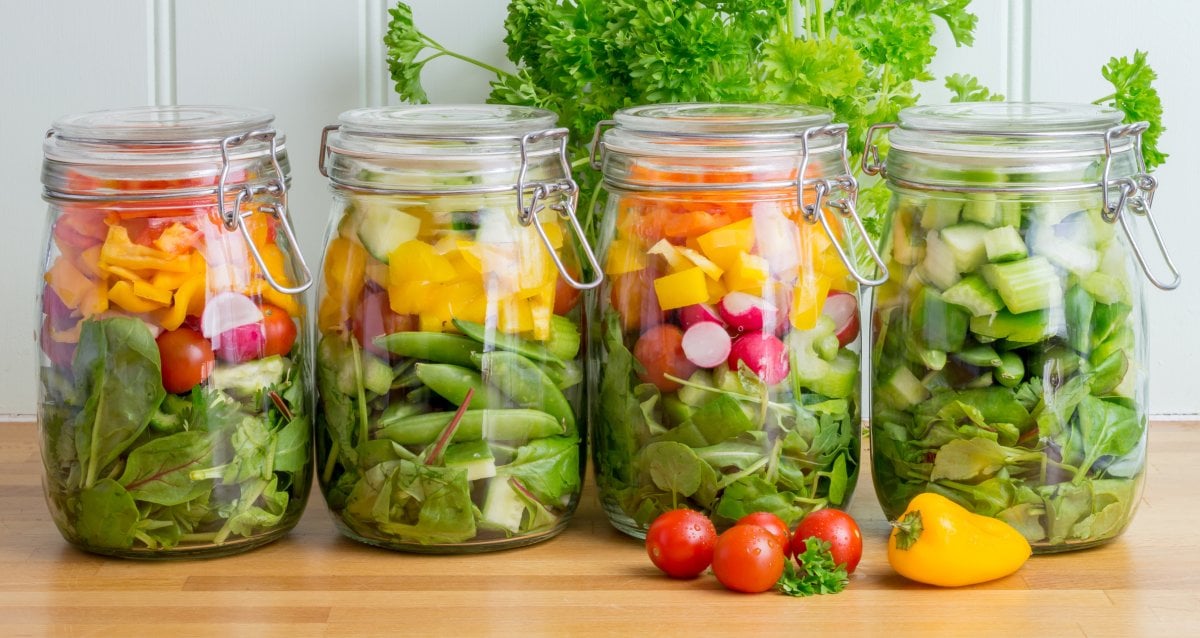
It’s always nice when friends and family offer to bring food or beverages to summer parties, like potlucks and picnics. Unfortunately, most store-bought foods come wrapped in plastic packaging. Or it’s stored in plastic containers that could be leaching harmful chemicals into the food.
Encourage your guests to instead bring homemade food and beverages in non-plastic, reusable food storage containers. And make sure they have lids to make the transport of leftovers easier.
Stainless steel and glass food storage containers or water bottles are safe alternatives to plastic. Both are non-porous and don’t include chemicals like BPA or phthalates.
Want to make your 4th of July or other summer BBQ plastic-bottle-free? Fill up a large, glass drink dispenser with water — either plain or naturally flavored with fruit slices.
If you do choose to use plastic containers, don’t store highly acidic foods such as tomato products in them (which can break down the plastic further), and never expose them to direct sunlight, put them in the dishwasher, or add hot foods to them.
Recycle Bottles, Cans, and Paper
Some single-use may be unavoidable, especially if party guests bring their own beverages. But that doesn’t mean they all need to end up in the landfill. Aside from having trash cans outside, set up a recycling station for guests to deposit their recyclables.
Important: Make sure to rinse out all containers before putting them out for your recycling service to pick up or if taking them to a recycling center.
Other Ways to Dine Sustainably Outdoors
Use Cloth Napkins
While they may seem like a less significant problem than plastics, paper products have a major effect on the environment too.
Worldwide, nearly 4 billion trees are used for the paper industry. That’s 35% of the total cut trees used for manufacturing.
And a single paper napkin can cause 10 grams of greenhouse gas emissions and use 0.3 liters of water.
“But what about napkins and towels made from recycled paper?” you might ask.
That’s a helpful step. It means the napkins or paper towels were made from recycled paper, but not from recycled napkins. Unfortunately, napkins themselves can’t be recycled. Each time recycled paper products are run through the process, the paper fibers get shorter, making them susceptible to disintegration.
Plus, if you’re using them during a BBQ or outdoor picnic, they’d likely have food and other contaminants on them that would make them unsuitable for recycling anyway.
Instead of contributing to deforestation, you might want to provide a stack of cloth napkins for your guests to use.
Compost Your Food Scraps
Around one-third of food produced for human consumption gets lost or wasted every year. In order to prevent unnecessary food waste, consider composting the food scraps from your 4th of July or summer parties.
If you already have a compost pile or bin at home, save your food scraps and add them to the mix.
Many cities across the U.S. also offer composting services and will pick up food scraps from your home.
Even if your city doesn’t offer compost pick up, there are independent companies who pick up food scraps for a fee from your home, or in some cases, even from a party or event location.
Or you can even give your compostables to someone with an existing compost pile via ShareWaste.
If you’re new to composting, here’s a basic list of what you can and can’t compost:
| What to Compost | What NOT to Compost |
| Fruit and vegetable scraps | Dairy products |
| Coffee grounds & filters | Oils |
| Tea bags | Meat or fish bones & scraps |
| Eggshells | Charcoal ash |
| Toothpicks | Pet waste |
| Compostable utensils, napkins, plates | Diseased plants |
Click here for more about composting and a full list of what you can and can’t compost.
Last But Not Least… Don’t Litter
If you’re dining outdoors, whether in your own backyard, at a park, or at the beach, make an effort to leave the area as clean as you found it (or cleaner!). Deposit all trash and recyclable items in trash cans or take them with you; leave nothing behind but footsteps and happy memories.
Tell us in the comments below:
- Do you do any of these things already?
- How will you keep your 4th of July (or other summer celebration) sustainable?
Featured Image: iStock.com/monkeybusinessimages
